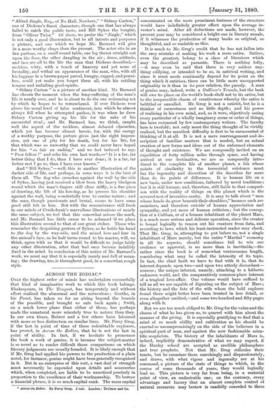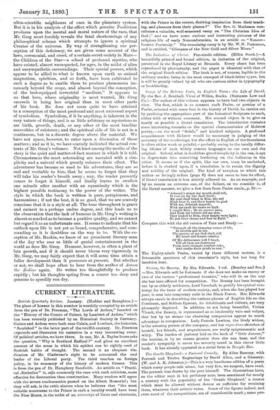ACROSS THE ZODIAC.*
ONLY the highest order of minds has undertaken successfully that kind of imaginative work to which this book belongs. Shakespeare, in The Tempest, has temperately and without effort realised the abnormal and the miraculous ; Goethe, in his Faust, has taken us for an airing beyond the bounds of the possible, and brought us safe back again ; Swift, on a much lower plane than either of these, has perhaps made the unnatural more minutely true to nature than they. In our own times, Bulwer and a few others have laboured with more or less distinction on similar lines. Mr. Percy Greg, if the last in point of time of these redoubtable explorers, has proved, in Across the Zodiac, that he is not the last in point of ability. In fact, if we hesitate to pronounce the book a work of genius, it is because the subject-matter is so novel as to render difficult those comparisons on which literary judgments are usually founded. It is likely enough that if Mr. Greg had applied his powers to the production of a plain novel, for instance, genius might have been generally recognised in it. But in an enterprise of this sort, a vast deal of strength must necessarily be expended upon details and accessories whiCh, when completed, are liable to- be unnoticed precisely in proportion to the excellence of their workmanship. To borrow a financial phrase, it is so much capital sunk. The same capital • dcrosa she Zodiac. By Percy Greg. 2 vole. London : Trabner and Cc.
concentrated on the more prominent features of the structure would have indefinitely greater effect upon the average in- vestor's mind. After all deductions are made, however, the present year may be considered a bright one in literary annals, if it witnesses the production of many books so original, 430 thoughtful, and so readable as this.
It is much to Mr. Greg's credit that he has not fallen into the easy mistake of making his work a mere satire. Satires, even the greatest, belong to a class of literature which may be described as parasitic. There is nothing lofty, —it may even be said that there is. very seldom any- thing edifying, or intended to be so, in satirical writing, and since it must needs continually depend for its point on the thing which it satirises, there can be little more unsupported originality in it than in its poor relation, the parody. A man of genius may, indeed, write a Otaliver's Travels, but the book will owe its place on the world's book-shelf not to its satire, but to the irrepressible charm of creativeness whereby the satire is belittled or annulled. Mr. Greg is not a satirist, but he is a thinker of earnestness and no little depth; and his power of realising in his own mind, and, as it were, objectively seeing every particular of a wholly imaginary scene or order of thugs, has been surpassed by few contemporary writers. The faculty here is twofold; not only must the thing thought of be vividly realised, but the manifest difficulty is first to be surmounted of thinking of it at all. It is not a mere rearrangement and de- scription of familiar matters that is needed, but an actual creation of new forms and ideas out of the unformed elements of thought and existence. We are composedly invited on an expedition of forty million miles through space, and having arrived at our destination, we are as composedly intro- duced to the complete life of another planet, a life whose points of similarity to the terrestrial existence must tax the ingenuity and discretion of the describer far more than do its points of difference. It is human life on a new basis, under new conditions, fathered by novel traditions ; but it is still human, and, therefore, still liable to that compari- son with the reality of things on this planet which is the severest test of inventive sanity. It is easy to talk about "men whose heads do grow beneath their shoulders," because such are monsters, and therefore outside of human appreciation and sympathy, and yet more of human criticism ; but the concep- tion of a Caliban, or of a human inhabitant of the planet Mars, is a much more serious and delicate operation, since the creator is bound logically to reason out his creature from data, and according to laws which his least-instructed reader may check. That Mr. Greg, in attempting to put before us, not a single inhabitant of Mars merely, but the entire " Martial " economy in all its aspects, should sometimes fail to win our credence or approval, is no more than is inevitable,—the rather since the book is of somewhat venturesome length, considering what may be called the intensity of its topic. In fact, the chief fault we have to find with it is, that its interest depends upon two—and upon two utterly discordant— sources; the unique interest, namely, attaching to a hitherto- unknown world, and the comparatively common-place interest of a tragical love-affair. One volume would have sufficed to- tell us all we are capable of digesting on the subject of Mars ; the history and the fate of the wife whom the bold explorer- found there might better have been treated in less detail, or even altogether omitted,—and some two hundred and fifty pages along with it.
But we are too much obliged to Mr. Greg for the value and the charm of what he has given us, to quarrel with him about the manner of the giving. It is especially gratifying to find that a mind of so much ability and cultivation as his should be exerted so uncompromisingly on the side of the believers in a spiritual part of man, and against the now fashionable scien- tific scepticistn. The history of the inhabitants of Mars is, indeed, implicitly demonstrative of what we may expect, if the Huxley school are accepted as credible philosophers and true prophets. Not that Mr. Greg ridicules their tenets, but he examines them searchingly and dispassionately, and draws, with what vigour and ingenuity are at his command, a picture of the state of things to which, in the course of some thousands of years, they -would logically lead us. This picture is very far from being, in a material point of view, an undesirable one ; on the contrary, every advantage and luxury that an almost complete control of natural resources may bestow is candidly conceded to these ultra-scientific neighbours of ours in the planetary system. But it is in his analysis of the effect which genuine Positivism produces upon the mental and moral nature of the race, that Mr. Greg most forcibly reveals the fatal shortcomings of any philosophical scheme which attempts to ignore a spiritual Creator of the universe. By way of strengthening our per- eeption of this deficiency, we are given some account of the laws, ceremonial, and creed, of a certain secret society in Men- the Children of the Star—a school of profound mystics, who have existed, almost unsuspected, for ages, in the midst of alien and unsympathetic surroundings. Their special powers, which appear to be allied to what is known upon earth as animal magnetism, spiritism, and so forth, have been cultivated to such a degree as to enable them to produce phenomena im- mensely beyond the scope, and almost beyond the conception, ,of the best-equipped terrestrial "medium." It appears to us that here, where originality is most wanted, Mr. Greg succeeds in being less original than in most other parts of his book. He does not seem quite to have attained to a conception of the most profound and most universal aspect of symbolism. Symbolism, if it be anything, is inherent in the very nature of things, and is as little arbitrary or mysterious as are birth, growth, death, or any other of the most familiar necessities of existence; and the spiritual side of life is not in a continuous, but in a discrete degree above the material. We have not space, however, to enter upon a discussion of these matters; and as it is, we have scarcely indicated the actual con- tents of Mr. Greg's volumes. Not least among the merits of the story is the quiet and matter-of-fact manner in which it is told. Circumstances the most astounding are narrated with a sim- plicity and a naivete which greatly enhance their effect. The adventurer has become so used to his adventures, they are so real and veritable to him, that he seems to forget that they will take his reader's breath away ; nay, the reader presently comes to forget it himself, and finally learns to swallow one miracle after another with an equanimity which is the highest possible testimony to the power of the writer. The style in which the book is written is pure, perspicuous, and harmonious ; if not the best, it is so good, that we are scarcely conscious that it is a style at all. The tone throughout is grave and earnest to a perhaps undue degree, and this leads us to the observation that the lack of humour in Mr. Greg's writing is almost so marked as to become a positive quality, and we cannot but regard it as an unfortunate one. It seems to indicate that his -outlook upon life is not yet so broad, comprehensive, and com- manding as it is doubtless on the way to be. With the ex- ception of Mr. Ruskin, we know of no prominent literary man of the day who sees so little of genial entertainment in the world as does Mr. Greg. Humour, however, is often a plant of late growth, and if it should never bloom very vigorously in Mr. Greg, we may fairly expect that it will some time attain a fuller development than it possesses at present. But whether • or not, we shall hope often to hear from the author of Across the Zodiac again. He writes too thoughtfully to produce rapidly ; but his thoughts spring from a source too deep and genuine to speedily run dry.



































 Previous page
Previous page